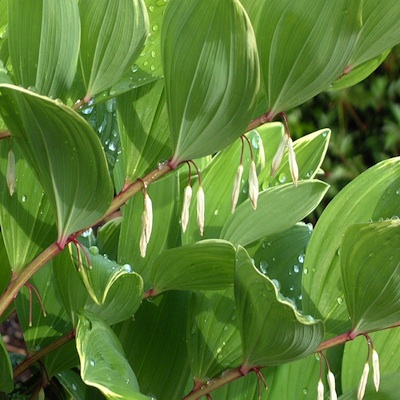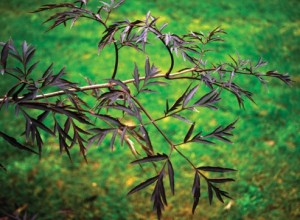
Variegatum Solomon's seal planted with Jack Frost Siberian bugloss (foreground). Photo courtesy perennialresource.com
The shade-loving variegated Solomon’s seal (Polygonatum odoratum) ‘Variegatum’ gets the latest nod from the 2013 Perennial Plant Association, a trade group of educators, plant breeders, retailers, horticulturists and marketers.
‘Variegatum’ has clean, green leaves with white markings. In spring, pairs of white flowers dangle from slightly arched branches. It is an upright plants that gets about 20 inches tall with a 20 inch spread at maturity. The plant turns a nice yellow in fall. Solomon’s seal is easy to grow, although a bit slow to establish and to reach maturity.
This perennial is perfect for woodland areas or parts of the garden in full or part shade. It does well in average soil as well as soil that is rich in organic matter. It has average water needs, but would benefit from a drink during hot dry periods until the plant is well established.
Solomon’s seal provides early season nectar for hummingbirds. The flowers on ‘Variegatum’ are slightly fragrant. It is an excellent cut flower. This variety is easy to propagate by division or by seed.
‘Variegatum’ is native in Europe and Western Asia, but smooth Solomon’s seal (P. biflorum) and hairy Solomon’s seal (P. pubescens) are native in eastern North America.
Good companions for Solomon’s seal are ‘Jack Frost’ Siberian bugloss (Brunnera macrophylla), hosta, ferns, lungwort (Pulmonaria), epimedium, woodland sedum (S. ternatum) and toad lily (Tricyrtis). Solomon’s seal also is a good companion for spring ephemerals and bulbs.

Variegatum Solomon's seal flowers dangle from gently arched branches. Photo courtesy perennialresource.com
Herb of the Year
Elderberry (can you say wine?) is the 2013 Herb of the Year by the International Herb Association.
An eastern North America native elderberry (Sambucus canadensis) is a large shrub that looks better in natural settings than as a centerpiece in the garden. There have been several new garden-worthy elderberry introductions (S. nigra) from Europe the last several years, including Black Lace and Black Beauty.

Black Lace elderberry (Sambucus nigra). Photo courtesy Proven Winners/ColorChoice Plants